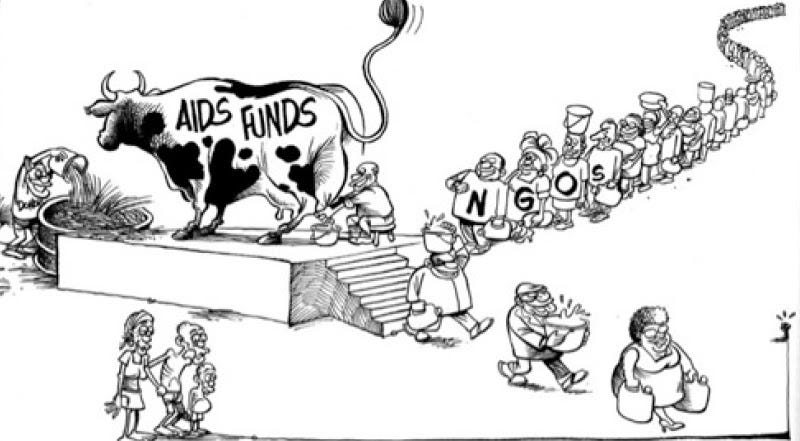Meditations On: “Democracy As Divide And Rule”, Yusuf Serunkuma (ROAPE .NET April 16, 2021)
By Master See
“One of the most powerful jokes of the 21st Century is the highly cited notion that “power belongs to the people”.
It never does, has never, and will never.
That in the exercise of democracy— specifically voting—ordinary folks wield power to determine the ways they are governed remains one of the biggest lies of our time.
The lie continues that by this single act of voting, they have power to restore civility, end dangerous policies of previous governments such as removing American troops from Iraq and Afghanistan, which since the start was based on fake intelligence, closing the very embarrassing Guantanamo Prison, or ensuring a minimum wage for workers etcetera.
It is all high-sounding nonsense.
Ordinary folks have no power, but would be constantly manipulated into the belief in electoral power.” - Yusuf Serunkuma
The reader is encouraged to read the entire article. While the writer’s focus is Afrika, the same phenomenon described exists in capitalist America.
In it, Serunkuma talks about the role played by European and American NGOs and associated “regional coordinators, country directors, programme managers and academics” in practicing the age-old tactic of “divide and conquer” by spreading “democracy” in Afrika. Yet clearly, the “western” home countries of capitalist NGOs do not exhibit the healthy democracy advocated for Afrika.
Democracy “peddlers” typically push “development assistance” in the form of loans. According to Serunkuma, “they actually force, squeeze, cajole, and harass an African country into receiving aid, but will never mention better terms of trade…”
“Aid” comes from the World Bank (WB), International Monetary Fund (IMF) and private lenders including commercial banks, hedge funds, bond markets, and private multilateral investment houses.
Serunkuma drives the point home:
“As a principle, a multi-party order divides the elite into polarized camps, political parties, with one forming the government and the other, the opposition. After the country’s intelligentsia is divided, the democracy brokers and merchandisers proceed to conquer them.”
Rapacious, vassal elites are obsessed with holding on to political office, truly the proverbial “cash cow”, at the expense of industrial and agricultural development. Sadly, critics are imprisoned and killed often depriving the “nation” of “brain power”.
In the late 1980s, the “new exploiters” ruined African economies when Afrikan “nations” were coerced into closing life-saving cooperatives. This dystopian action made farming unprofitable causing increased rural poverty.
Local banks were closed often without explanation and were quickly replaced by European and Asian banks. The result has been smothering interest rates generating handsome profits that leave the continent for off shore tax havens. To make matters worse, access to credit for small farmers and local businesspeople is exceptionally challenging if not impossible.
The one-way, asymmetrical, dependent financial relationship between Afrikan “nations” and the capitalist “West”, that is, the US-NATO-EU axis is essentially coloniality of power to the extreme detriment of Afrikans. This means that the political and economic infrastructure of colonialism remains intact in Afrika despite the collapse of direct administrative control aka colonialism.
Another example of the asymmetrical, colonial arrangement in existence between Afrika and the US-NATO-EU axis is the infamous “American Exceptionalism” that plays out in the form of huge subsidies paid by the US government to farmers, which is supposedly illegal under World Trade Organization rules whose stated mission is, “Promotion of growth by facilitating trade…”. The real mission of the WTO is “promotion of growth by closing local coops and banks, creation of debt traps, and bribing and intimidating political elites.
The West’s “illegal” subsidies leave poor Afrikan “nations” economically prostrate and unable to compete on the global market.
Serunkuma ends with heavy critiques of neoliberal, capitalist “democracy”:
“The language of democracy ensures the best brains of the country are split into conflicting camps, one obsessed with the holding onto the presidency as much of the intelligentsia remains blind but also conscripted to the networks and channels of exploitation.”
The rampant political and economic instability apparent in capitalist America today, that is, seemingly endless violence, useless government bodies, unmanageable pandemics, decreasing life expectancy, increasing homelessness, increasing political and economic inequality, and permanent unchangeable institutional racism and patriarchy are powerful indicators of the absence of democracy.
The unavailability of safe drinking water in Flint, MI, Jackson, MS and other poor communities across the U.S., extremely aggressive, violent policing, mass incarceration, homelessness, poor health and other dystopian indicators also provide powerful evidence that claims of the existence of republican democracy emanating from the US-NATO-EU axis are false and continuous with the false dominant capitalist narrative.
Conclusion
Serunkuma describes the tactics and strategies used by capitalist agents in the persons of Western NGOs and associated “regional coordinators, country directors, programme managers and academics” in weakening Afrika by pushing “democracy” onto Afrikan elites.
By way of various programs supposedly designed to spread democracy and assist the development of Afrika, the “new exploiters” expand the finance, business and trade activities of European and American capitalists into local Afrikan markets.
Consequently, Western NGOs compromise Afrika and Afrikan political elites financially (dependency inducing “aid” loans), economically (asymmetrical dependent trade) and intellectually (politically destabilizing democracy promotion), thereby postponing the Afrikan Renaissance.




